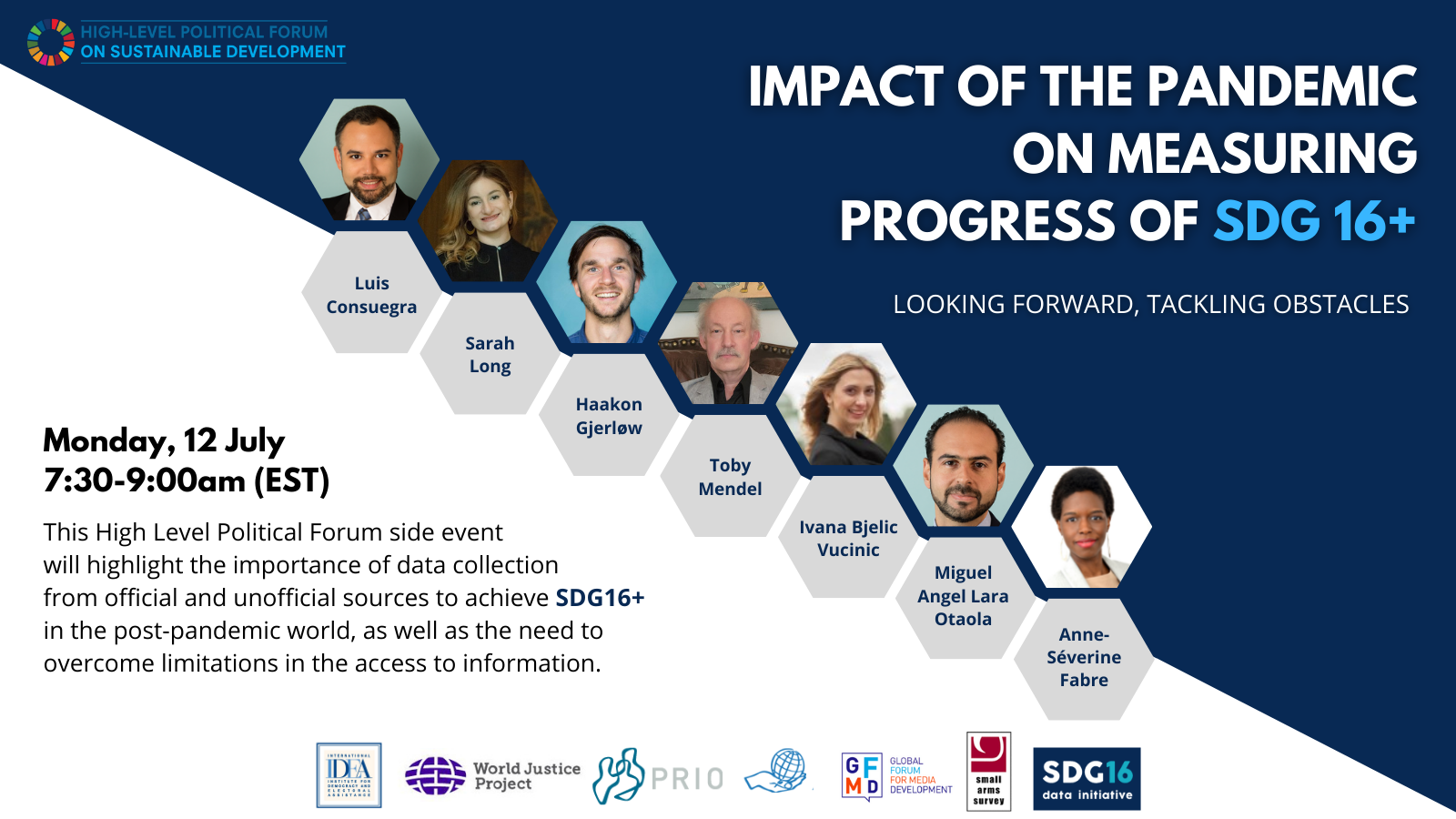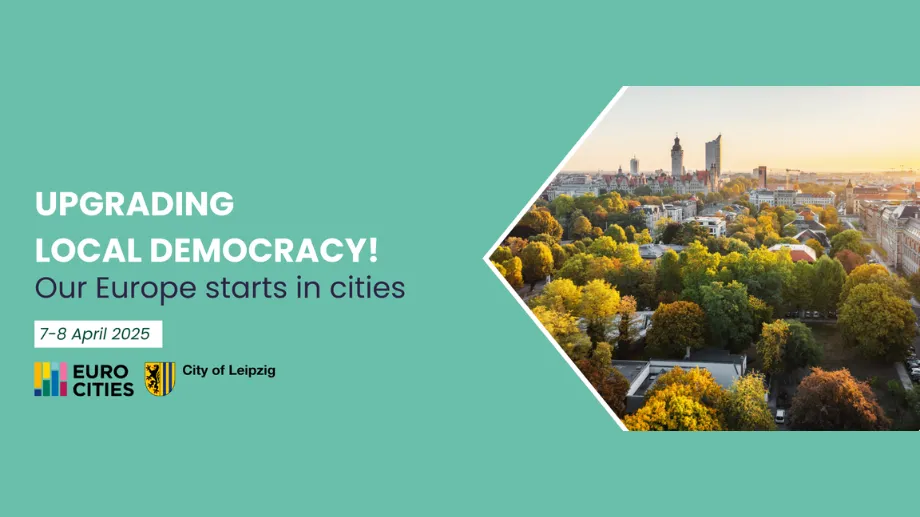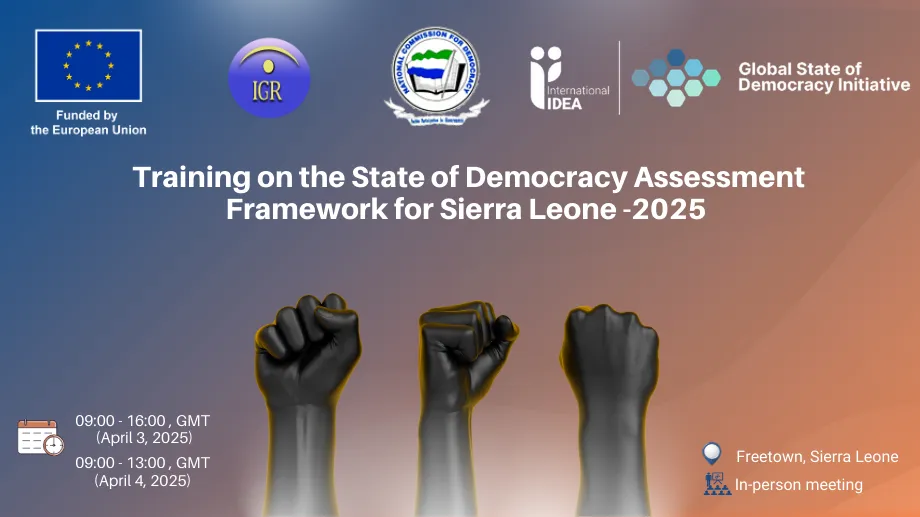Impact of the Pandemic on Measuring Progress of the SDG 16+: Looking Forward, Tackling Obstacles

On Monday, 12 July, members of the SDG16 Data Initiative— a collective project by a consortium of 17 organizations seeking to support tracking the global commitments made by more than 194 countries on peace, justice, and strong institutions— held a side event on the margins of the 2021 High-Level Political Forum (HLPF) to discuss challenges and opportunities on the creation of data and measurement of progress in achieving SDG16 during and after the pandemic; and to hold a conversation on the SDG16 Data Initiative Global Report 2021, which will be launched at the end of 2021 as a collaborative effort among the members of the Initiative.
The event was moderated by Luis J. Consuegra, Strategic Partnership and Outreach Advisor at International IDEA, and it included panelists from different organizations that are part of the SDG16 Data Initiative. The purpose of the conversation was to discuss findings and recommendations to recover from the pandemic, highlight the importance of data collection—from official and non-official sources—in the post-pandemic world, and discuss solutions to overcome
Miguel Angel Lara Otaola, Senior Democracy Assessment Specialist at International IDEA, began the conversation by offering an overview on the Global State of Democracy (GSoD) Indices to support measurement of the SDG16 and assess the quality of democracy worldwide. “Democracy is an enabler of sustainable development”, stated Mr Otaola, and it carries a very unique intrinsic value to harbor human dignity (fundamental rights, freedom of expression)—but also a specific instrumental value for the development of society, as it constitutes the outlets for changing the system and its structures.
Sarah Chamness Long, Director for Access to Justice Research at the World Justice Project (WJP), provided a snapshot of current challenges pertaining to rule of law and access to justice, namely persistent declines in constraints on government powers and fundamental rights over the last five years, as well as pervasive and largely unmet justice needs. Preliminary evidence suggests that these challenges – as well as challenges in collecting data to monitor these trends – have been exacerbated by the COVID-19 pandemic. Ms Long offered some concrete recommendations for monitoring these trends and suggested leveraging partnerships, using existing and non-official data, as well as exploring alternative data collection methodologies to increase data availability.
Access to reliable information is key to monitoring progress, but it becomes a demanding challenge when governments try to silence information about battle zones and conflicts. Haakon Gjerløw, Senior Researcher at Peace Research Institute Oslo (PRIO), presented some innovative recommendations to monitor conflicts, support the independent press and have access and report on battle zones by creating a crowd coding app, Conflict Cartographer, to try to predict where conflicts will occur in the future and be able to still get information from those battle zones.
On the topic of assessing progress on adopting and implementing access to information legislation, Toby Mendel, Executive Director of the Centre for Law and Democracy (CLD), highlighted the supportive relationship between trust and transparency when it comes to governments and, coupled with freedom of expression, the cross-cutting effect on all SDGs of transparency, which is why it is so important to measure it and monitor its progress. Covid-19 has placed huge pressure on the relationship between government and citizens, because leaders all over the world have been forced to ask citizens to engage in unusual social behavior (wear masks, practice social distance) that is normally outside of the remit of governance. Although transparency is foundational to maintaining trust, many governments have taken advantage of the pandemic to become more secretive. “Access to information is key to accountability”, stated Mendel. Fortunately, we now have better ways to assess progress on this right and hopefully the SDGs can be used to lever up progress in this area.
Ivana Bjelic Vucinic, Project Manager at Global Forum for Media Development (GFMD), spoke about the safety of journalists, and illustrated how data provided by international press freedom groups and human rights organizations report constant decline and deterioration in the environment for independent journalism. She also discussed the issue of impunity and staggering increase of violence against journalists—women, specifically—and the heightening of new forms of violence against women, today also victims of gendered online violence and attacks.
“The pandemic has shed a light on the importance of data”, expressed Data Expert for Small Arms Survey, Anne-Séverine Fabre, and highlighted the challenges and opportunities of collecting reliable data and having access to it. The use of digital tools and interactions, for example, has been a positive outcome of the pandemic, because around the world we have been forced to rely on those new tools to work and communicate, and those tools have given us the possibility to reach more people and improve our access to information to some extent. However, adapting to digital tools is not always easy and practical, and while we have seen a global improvement of those tools and digital communication, some regions have had more difficulties in being part of this tele-networking. Other aspects of sharing of information have been a challenged by the digitalization, such as the sharing of sensitive information, including through new partnerships based on strictly virtual interactions.
The Covid-19 pandemic has presented significant challenges to the implementation of the 2030 Agenda for Sustainable Development, from limitations in the capacity to collect official and non-official data to challenges in terms of progress in achieving all 12 SDG16 targets, including those discussed above. Evaluating and measuring progress during and after the pandemic is a difficult but crucial task, because it can provide a current picture of the state of SDG16 around the world. It can also indicate early warning signs for threats to SDG16, such as democratic backsliding, reduced access to information, threats to human rights, and diminished institutional transparency. The monitoring of these and other trends, by both official and non-official actors, is vital for ensuring sustained progress towards peace, justice and inclusion.
More resources related to the event can be found below:
- Power Point Presentation by Haakon Gjerløw
- Power Point Presentation by Sarah Long
- Power Point Presentation by Ivana Vucinic
- Power Point Presentation by Miguel Angel Lara Otaola
- Recording of the event on International IDEA's YouTube Channel
- Biography of the Panelists



